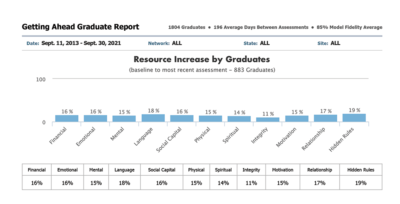The underlying theory about poverty is explicitly addressed in Getting Ahead and therefore should be reported on in outcome reports. In the simplest terms, poverty is defined as the lack of 11 resources that are needed for a full life. The development of those resources is dependent on the level of stability in a person’s life. If a person in poverty can stabilize their environment, they will find it easier to build resources.
For those who look for a financial return on investment (financial resources are one of the 11 resources), it is necessary to report on financial outcomes as well.
The data gathered by CharityTracker is provided by each Getting Ahead site and is compiled by state in this national report. It is based on results for 833 graduates from 20 states. The period of time between the first assessment done while in Getting Ahead and the follow-up assessment averaged just 196 days. That is not much time for anyone to make improvements in stability and resources or to increase monthly income, reduce monthly and total debt, increase assets, and decrease the use of public benefits. And yet, you can see the progress made in that short time.
Given more time, outcomes improve, as in the case of 88 graduates from New York who had a full year between assessments. Their lives became more stable, they built higher resources, and the return on investment improved.
This report sums up the hard work of the investigators (as the Getting Ahead participants are called), Getting Ahead facilitators, sponsors, funders, and Bridges communities that support them.









